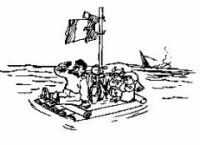Bella la poesia, Luigi.
Talmente bella che per questa ed altre cose da lui scritte, l'Autore fu internato in manicomio dal 1945 al 1958. A dire il vero l'accusa nei suoi confronti fu di alto tradimento per aver vissuto in modo attivo in Italia durante la guerra, ed aver fatto trasmissioni di propaganda anti-guerra dirette verso gli USA, sua patria. Per una volta la lobby culturale americana riuscì a far qualcosa di buono e con i consueti metodi suoi propri per prima cosa riuscì a non farlo condannare a morte per alto tradimento. Venne quindi considerato fortemente malato di mente e rinchiuso in un manicomio criminale. Ci restò fino al 1958, anno in cui le continue pressioni riuscirono a farlo uscire. Lui tornò nella "sua" Italia, dove, a Venezia, condusse una vita estremamente ritirata fino alla sua morte, nel 1972. (I preti delle superiori mi hanno insegnato bene, eh?

).
Ecco un altro suo componimento, che vi metto in lingua originale. Noterete che - in via forse meno esplicita, univoca e violenta di quanto espresso in quella postata da Luigi - uno degli obiettivi è lo stesso. Però affronta la questione da un punto di vista più lontano, la scala usata è minore. Ma è per me anche la prefazione a quella postata da Luigi. Secondo molti critici, questa poesia, del 1920 - anno in cui egli lascerà l'Inghilterra (ove visse per più di 10 anni) per arrivare dopo un paio d'anno in Italia - è un'autobiografia in versi del poeta stesso.
Ah, per chi non l'avesse capito stiamo parlando ovviamente di E.P. (

)
For three years, out of key with his time,
He strove to resuscitate the dead art
Of poetry; to maintain "the sublime"
In the old scene. Wrong from the start--
No, hardly, but seeing he had been born
In a half-savage country, out of date;
Bent resolutely on wringing lilies from the acorn;
Capaneus; trout for factitious bait;
[idmen gar toi pant, hos eni Troiei]
Caught in the unstopped ear;
Giving the rocks small lee-way
The chopped seas held him, therefore, that year.
His true Penelope was Flaubert,
He fished by obstinate isles;
Observed the elegance of Circe's hair
Rather than the mottoes on sun-dials.
Unaffected by "the march of events,"
He passed from men's memory in l'an trentuniesme
De son eage; the case presents
No adjunct to the Muses' diadem.
II
The age demanded an image
Of its accelerated grimace,
Something for the modern stage,
Not, at any rate, an Attic grace;
Not, not certainly, the obscure reveries
Of the inward gaze;
Better mendacities
Than the classics in paraphrase!
The "age demanded" chiefly a mould in plaster,
Made with no loss of time,
A prose kinema, not, not assuredly, alabaster
Or the "sculpture" of rhyme.
IV
These fought in any case,
and some believing,
pro domo, in any case . . .
Some quick to arm,
some for adventure,
some from fear of weakness,
some from fear of censure,
some for love of slaughter, in imagination,
learning later . . .
some in fear, learning love of slaughter;
Died some, pro patria,
non "dulce" non "et decor" . . .
walked eye-deep in hell
believing in old men's lies, then unbelieving
came home, home to a lie,
home to many deceits,
home to old lies and new infamy;
usury age-old and age-thick
and liars in public places.
Daring as never before, wastage as never before.
Young blood and high blood,
fair cheeks, and fine bodies;
fortitude as never before
frankness as never before,
disillusions as never told in the old days,
hysterias, trench confessions,
laughter out of dead bellies.
V
There died a myriad,
And of the best, among them,
For an old bitch gone in the teeth,
For a botched civilization,
Charm, smiling at the good mouth,
Quick eyes gone under earth's lid,
For two gross of broken statues,
For a few thousand battered books.
Ciao
Art. Federico
40a Btr, AMF(L)
Gr.A.Mon. "Pinerolo"
(4° Rgt. A. Mon.)
Brigata Alpina Taurinense
3°/86








